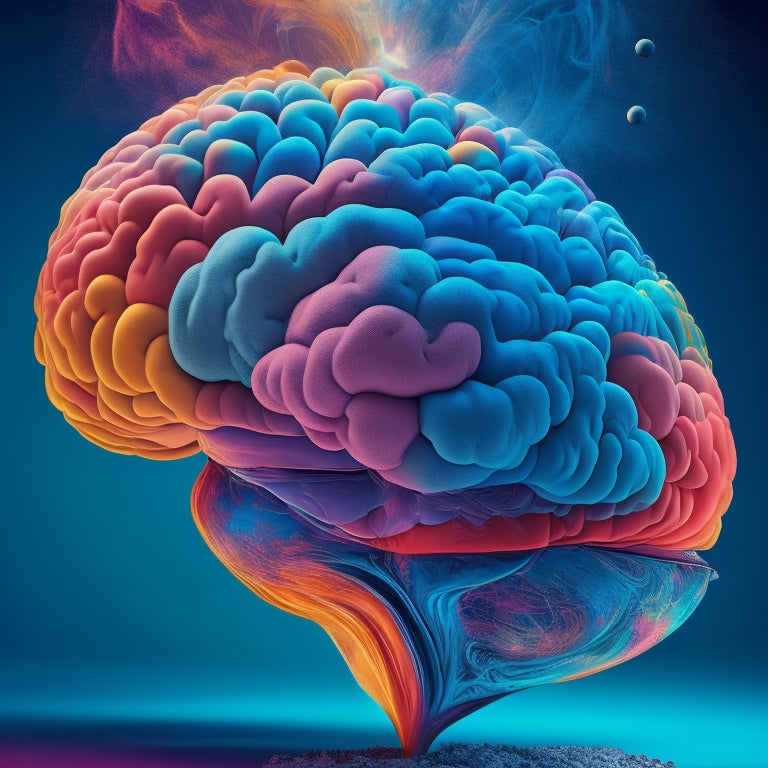
Revolutionize Your Study Skills With Mind Mapping
Share
Mind mapping is a powerful tool that has been proven to greatly enhance study skills and academic performance by providing a clear and concise visual representation of complex information. By tapping into the benefits of mind mapping, students can improve their ability to access, process, and retain complex information, leading to better understanding and retention of course materials. Mastering mind mapping techniques can also foster critical thinking, creativity, and problem-solving skills, allowing students to tap into their full potential for academic excellence. To unleash the full potential of mind mapping, discover how to apply advanced techniques and tools to take your study skills to the next level.
Key Takeaways
• Mind mapping enhances study skills and academic performance by providing a clear and concise representation of complex information.
• It promotes critical thinking, creativity, and problem-solving skills, helping students tap into their full potential for academic excellence.
• By using vibrant colors and visuals, mind mapping techniques improve retention and recall, making it easier to access and process complex information.
• Mind maps can be used to create study guides, brainstorm essay ideas, and plan research projects, facilitating effective learning and improving overall academic performance.
• By mastering mind mapping techniques, students can experience benefits such as improved memory retention, critical thinking, and confidence in tackling complex topics and assignments.
Unlocking Mind Mapping Benefits
By harnessing the cognitive potential of mind mapping, students can access a wealth of benefits that greatly enhance their study skills and overall academic performance.
Mind mapping visual aids provide a clear and concise representation of complex information, allowing students to better organize and connect ideas. Additionally, mind mapping memory techniques, such as chunking and association, improve memory retention and recall. This enables students to retain information more effectively, leading to improved academic performance.
Moreover, mind mapping promotes critical thinking, creativity, and problem-solving skills, essential for academic success. By incorporating mind mapping into their study routine, students can tap into their full potential and achieve academic excellence.
Mastering Mind Mapping Techniques
Effective mind mapping techniques require a deliberate and structured approach to harness the full potential of this powerful study tool, enabling students to maximize their learning outcomes and achieve academic success.
By mastering mind mapping strategies, students can enhance their study technique enhancements and unleash their full potential.
Here are some essential techniques to get started:
- Develop a clear central idea or concept to anchor your mind map
- Use vibrant colors and visuals to stimulate creativity and engagement
- Create branching lines to organize and connect related ideas
- Focus on key words and phrases to guarantee concise and meaningful notes
- Review and revise your mind maps regularly to reinforce learning and retention.
Applying Mind Maps to Studying
Mind maps can be seamlessly integrated into various aspects of studying, providing a visual framework for organizing and connecting ideas, and ultimately enhancing overall academic performance. By applying mind mapping strategies, students can facilitate effective learning through visual representation of complex topics. This visual learning approach enables students to better understand and retain information, making it an ideal study technique.
Mind maps can be used to create study guides, brainstorm essay ideas, and plan research projects, among other applications. By incorporating mind maps into their study routine, students can improve their focus, concentration, and creativity, leading to better academic outcomes.
Mind Mapping for Academic Success
Utilizing mind mapping techniques can greatly enhance a student's ability to access, process, and retain complex information, thereby paving the way for academic success. By implementing effective mind mapping strategies, students can improve their understanding and retention of course materials, leading to academic excellence.
- Access your full potential with mind mapping and achieve academic success.
- Revolutionize your study habits with a visual approach to learning.
- Experience the benefits of improved memory retention and critical thinking.
- Boost your confidence in tackling complex topics and assignments.
- Achieve academic excellence with the power of mind mapping.
Taking Study Skills to Next Level
As students master the fundamentals of mind mapping, they can further refine their study skills by applying advanced techniques and tools to tackle complex academic challenges.
To take their study skills to the next level, students can explore creative study strategies, such as incorporating visual learning techniques to enhance retention and recall.
Effective study habits, like regular review and revision, can be further optimized by leveraging cognitive mapping techniques that facilitate deeper connections between ideas.
Frequently Asked Questions
Can I Use Mind Mapping for Non-Academic Projects and Goals?
"Unlock the treasure chest of creativity: mind mapping extends beyond academics, empowering individuals to visualize and achieve personal goals and creative projects, fostering innovative problem-solving and strategic planning."
How Do I Choose the Right Mind Mapping Tool for My Needs?
When selecting a mind mapping tool, conduct a feature comparison and read tool reviews to identify the best fit for your needs, considering factors such as customization options, task management features, and user interface.
Are Mind Maps Suitable for Students With Dyslexia or Learning Disabilities?
Like a key opening a treasure chest, mind maps can be a powerful tool for students with dyslexia or learning disabilities, offering Dyslexia Accommodations by visually overcoming Learning Barriers, enhancing comprehension and retention.
Can I Create Mind Maps on a Mobile Device or Only on a Computer?
When creating mind maps, mobile devices offer viable alternatives to computers, leveraging apps like Ayoa, DropTask, or OpenGenius, which overcome mobile limitations, providing flexibility and convenience for students to organize their ideas on-the-go.
How Do I Share and Collaborate on Mind Maps With Classmates or Teammates?
To share and collaborate on mind maps with classmates or teammates, utilize online mind mapping tools that offer real-time feedback and secure sharing features, ensuring seamless collaboration and protecting sensitive information.
Related Posts
-

Create Your Own Kitchen Countertop Organizer System
To create your own kitchen countertop organizer system, start by evaluating your available counter space, identifying...
